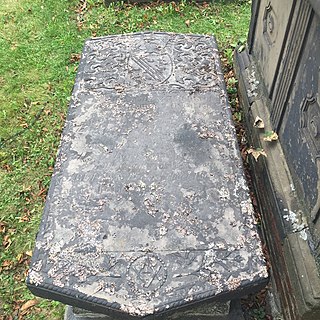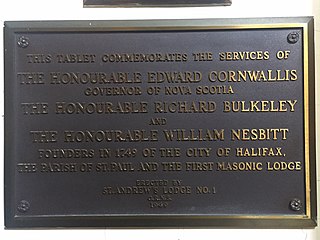Related Research Articles

Events from the year 1773 in Canada.
Michael Francklin or Franklin served as Nova Scotia's Lieutenant Governor from 1766 to 1772. He is buried in the crypt of St. Paul's Church (Halifax).

Malachy Salter was an American-born merchant and politician who sat in the Nova Scotia House of Assembly from 1759 to 1772.
George Suckling was a lawyer who was appointed to be the first Chief Justice of the British Virgin Islands in 1776. Suckling's appointment was not popular in the islands, which were at the time a notorious haunt for the lawless and for those seeking to evade their creditors elsewhere. He also served as a member of the 1st General Assembly of Nova Scotia from 1758 to 1759 and was the first Attorney General in Quebec, serving under James Murray from 1764 to 1766, when he was removed from office.
The General Assembly of Nova Scotia was established by a proclamation of the Governor in Council on May 20, 1758. A writ for the election of the 1st General Assembly of Nova Scotia was issued by May 22, returnable at the convening of the assembly on October 2, 1758. The assembly held two sessions, and was dissolved on August 13, 1759.
A writ for the election of the 2nd General Assembly of Nova Scotia was issued on August 23, 1759. The assembly convened on December 4, 1759, held two sessions, and was dissolved by the death of King George II on October 25, 1760.
The 5th General Assembly of Nova Scotia represented Nova Scotia between May 1770 to 1784, its membership being set in the 1770 Nova Scotia general election.

Winckworth Tonge was an Anglo-Irish soldier who served in North America, where he became a land owner and political figure in Nova Scotia after his military service. He represented Cumberland County from 1759 to 1760, King's County from 1765 to 1783 and Hants County from 1785 to 1792 in the Nova Scotia House of Assembly.

Richard Bulkeley was an influential administrator in Nova Scotia from 1749 to 1800. Historian Phyllis Blakeley writes that Bulkeley, "assisted 13 governors and lieutenant governors from Cornwallis to Wentworth. In half a century of service he took part in the founding of Halifax, the immigration of New Englanders and loyalists, and the prosperity of the French revolutionary wars." During his lifetime, known for hosting dignitaries and grand parties, he was known as "the Father of the Province." When he died, he was the last surviving settler who arrived with Cornwallis.

William Nesbitt was a lawyer and political figure in Nova Scotia. He served as a member of the Nova Scotia House of Assembly from 1758 to 1783.
Archibald Hinshelwood was a lawyer, merchant and political figure in Nova Scotia. He briefly sat on the 1st General Assembly of Nova Scotia in April 1759, but his election was disputed. He was a member of subsequent assemblies from 1759 to 1773, representing Lunenburg County from 1761 to 1765 and from 1770 to 1773, and Lunenburg Township from 1765 to 1770. His name also appears as Hinchelwood.

William Foye was a political figure in Nova Scotia. He was a member of the Nova Scotia House of Assembly from 1758 to 1759.
Robert Sanderson was a merchant, ship owner and political figure in Nova Scotia. He was a member of the 1st General Assembly of Nova Scotia.
Richard Upham was a political figure in Nova Scotia. He briefly represented Onslow Township in the Nova Scotia House of Assembly in 1775.
John Butler Dight (Butler) (c. 1760 – July 2, 1854) was a merchant and political figure in Nova Scotia. He represented Cumberland County in the Nova Scotia House of Assembly from 1785 to 1793.
Douglas Neil Brodie was a businessman and political figure in Nova Scotia, Canada. He represented Cape Breton East in the Nova Scotia House of Assembly from 1941 to 1945 as a Co-operative Commonwealth Federation member.
Edward Joseph Cragg was a civil servant, businessman and political figure in Nova Scotia, Canada. He represented Halifax County in the Nova Scotia House of Assembly from 1928 to 1930 as a Liberal member.
Henry Gibson Bauld was a merchant and political figure in Nova Scotia, Canada. He represented Halifax County in the Nova Scotia House of Assembly from 1916 to 1925 as a Liberal member.
Joseph Barss was a mariner, merchant and political figure in Nova Scotia. He represented Liverpool Township in the Nova Scotia House of Assembly from 1799 to 1811.
John Newton was a surveyor, official and political figure in Nova Scotia. He served as a member of the 2nd General Assembly of Nova Scotia for Annapolis Township and then represented Halifax County from 1770 to 1772 and Lunenburg County 1775–1785.
References
- ↑ "Documentary history of the state of Maine". Portland.
- A Directory of the Members of the Legislative Assembly of Nova Scotia, 1758-1958, Public Archives of Nova Scotia (1958)
- The Rules and Orders to be observed by the Members of the Union Fire-Club (1759 reprint)